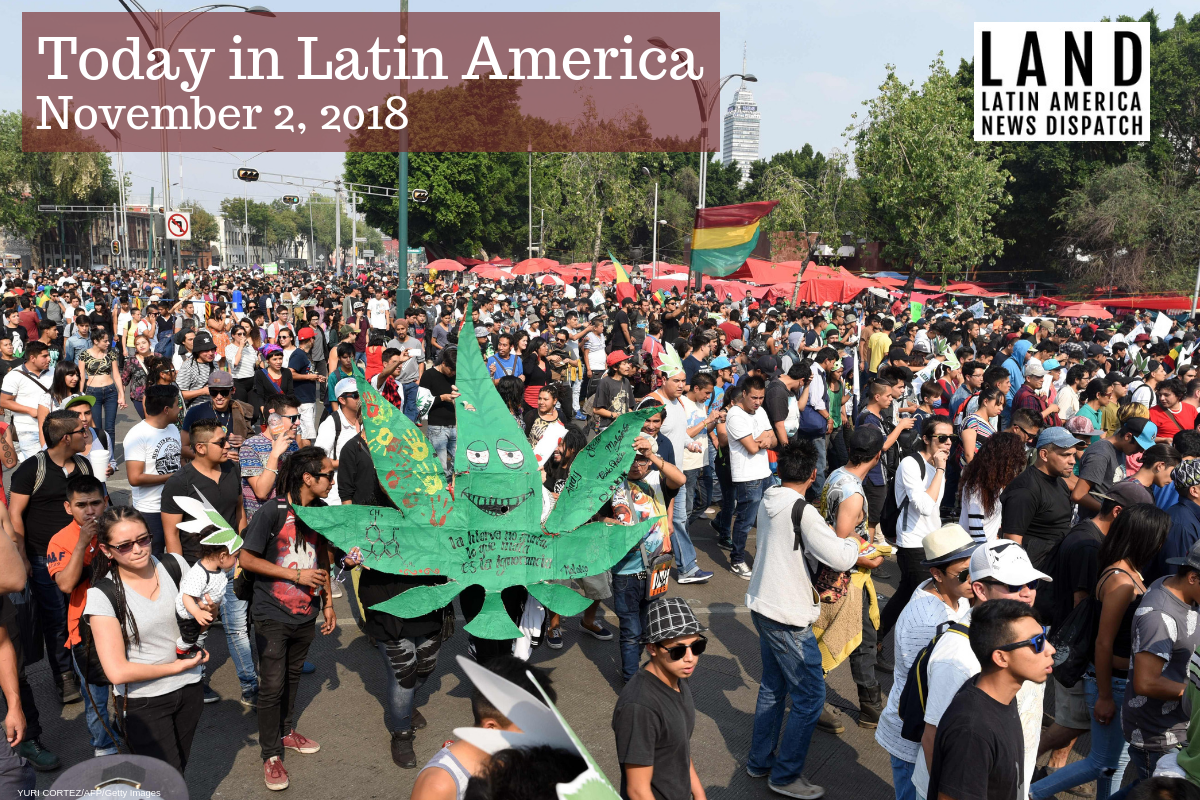

Activists march in Mexico City demanding the depenalization of marijuana. May 6, 2017. (Photo by Yuri Cortez/AFP/Getty Images)
MEXICO: President-elect Andrés Manuel López Obrador said yesterday that the government should respect the Supreme Court’s decision striking down the ban on recreational marijuana use. The court ruled Wednesday that the ban on personal use or consumption violated Mexicans’ “fundamental right to the free development of the personality.”
Lawmakers will need to change the law to comply with the ruling, though they will have some freedom in how they decide to implement it. One of the major questions left over from the decision is how the public will get the drug, since its sale is still illegal in Mexico. Supporters say legalization will reduce violence associated with the war on drugs, while opponents worry that crime and black market sales will still be the norm.
This decision comes less than a month after Canada’s legalization law went into effect. Mexico decriminalized marijuana in 2017.
HEADLINES FROM THE WESTERN HEMISPHERE
NORTH AMERICA
MEXICO: The larger of two caravans traveling through Mexico changed its route yesterday toward the Gulf coast. If the migrants continue up the eastern coast of the country, they will reach the Texas section of the border. Mexican police have been slowing the group by forcing them off vehicles such as freight trucks. The same day that he released a political ad drawing on negative stereotypes about undocumented immigrants, President Trump said he would send up to 15,000 troops to the border and change the rules that allow migrants to request asylum in the United States.
MEXICO: Mexico City is in the midst of a massive water shutdown, known as the Megacorte, as workers repair its 200-mile-long system. The Cutzamala system pumps water up the mountains and throughout the city, leaking much of it along the way. The system will be running again by Saturday morning, but some residents may not have running water until Tuesday, according to the leader of the municipal water department. In the meantime, residents are buying bottles and plastic containers and renting water trucks called pipas.
THE CARIBBEAN
CUBA: The United Nations General Assembly voted yesterday to approve a resolution condemning the American economic embargo of the island. While the resolution is unenforceable, it sent a powerful message with 189 countries voting in favor and only the United States and Israel voting no. Cuban President Miguel Díaz-Canel also arrived in Russia yesterday on a state visit to meet with Russian President Vladimir Putin. The two countries have talked recently about expanding military ties.
CENTRAL AMERICA
EL SALVADOR: Salvadoran President Salvador Sánchez Cerén met with Xi Jinping in Beijing yesterday, just two months after El Salvador broke ties with Taiwan. Dominican President Danilo Medina had met with Jinping earlier this week. Taiwan is a longtime ally of the U.S., which pulled diplomatic envoys from El Salvador, Panama, and the Dominican Republic last month after they cut ties with Taiwan.
HONDURAS: Heide Fulton, the Chargé d’Affaires of the U.S. embassy in Honduras, said yesterday that “arriving illegally is not the solution” for Hondurans. She also said that the U.S. will continue working with Honduras to achieve a “more prosperous future with peace and tranquility,” and insisted initiatives were in place to aid the economy of Honduras. She had previously tweeted that the caravan was a “journey destined to fail.”
Miembros de la caravana: No se empobrezcan en un viaje destinado a fracasar. Aprovechen un Retorno Seguro del gobierno de Honduras; o el plan Estás en tu Casa del gobierno de México, que te proveerá atención médica, empleo temporal y escuela para menores de edad.
— Chargé Heide Fulton (@USAmbHonduras) October 31, 2018
THE ANDES
ECUADOR: The Ecuadorean attorney general said yesterday that the United Kingdom has guaranteed they will not extradite Julian Assange, thereby alleviating the fear of facing the death penalty abroad for his hand in leaking highly-classified U.S. military and diplomacy documents in 2010. Current U.K. Secretary of State Jeremy Hunt and his predecessor Boris Johnson made similar statements assuring that Assange would not be extradited last summer.
SOUTHERN CONE
BRAZIL: Newly-elected Brazilian President Jair Bolsonaro appointed Sérgio Moro yesterday as Brazil’s justice minister. Moro is a judge who has risen to political fame due to his central role in the Odebrecht investigation in Brazil. His appointment raises questions regarding political bias in former president Luiz Inácio Lula da Silva’s conviction, as well as the political objectivity of the “Car Wash” investigation more broadly. Since his election this past Sunday, Bolsonaro has also denounced opposition media and journalists, referring to any news in Brazil that is unfavorable of his election as “fake news.”
ARGENTINA: The World Bank and the Inter-American Development Bank approved yesterday three loans to Argentina, totaling more than $1.8 billion. The announcement comes one week after the approval of an unpopular budget plan that passed in order to meet the terms of a record $57 billion loan from the IMF. The plan was met with protests outside the capitol building last Wednesday


